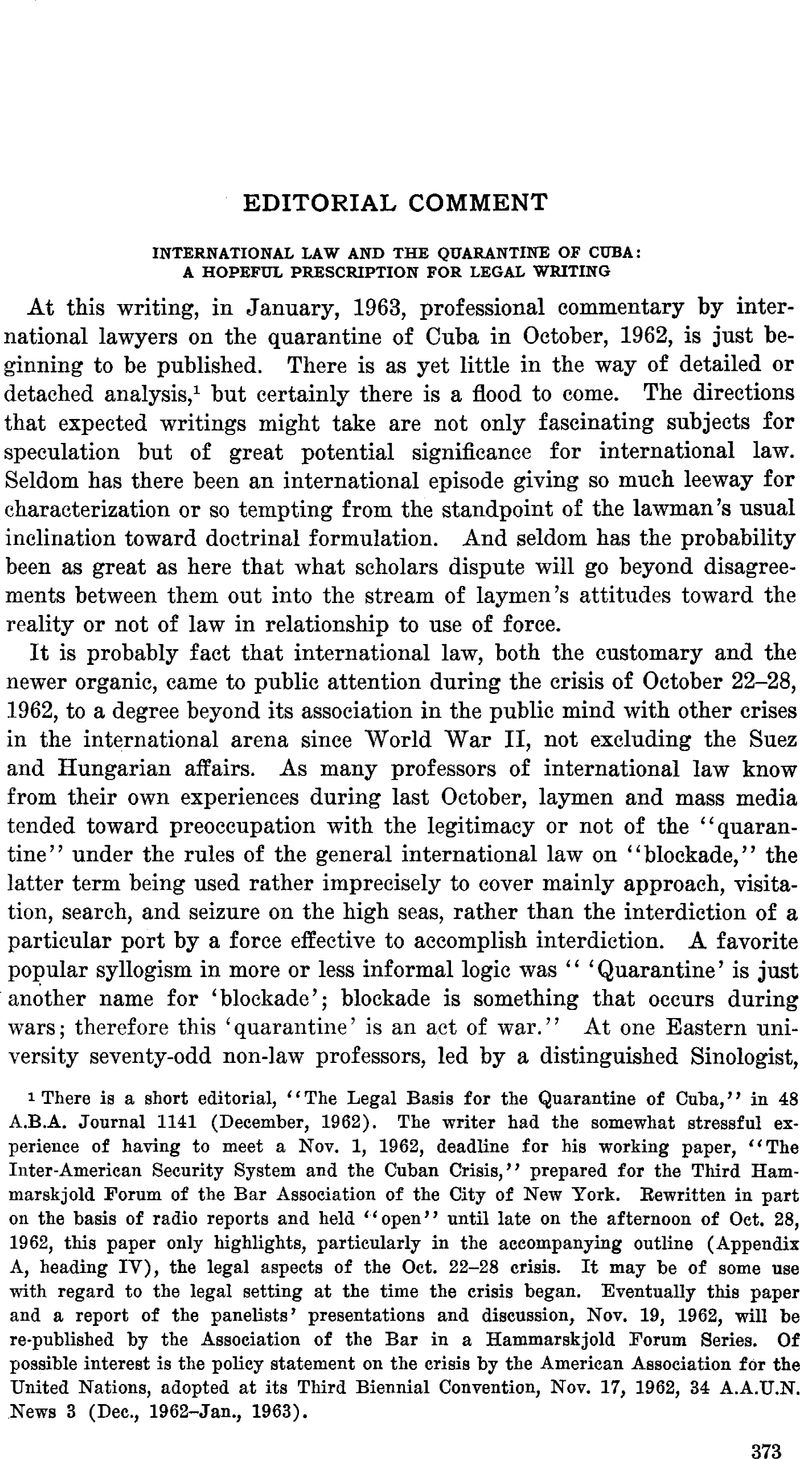Article contents
International Law and the Quarantine of Cuba: A Hopeful Prescription for Legal Writing
Published online by Cambridge University Press: 28 March 2017
Abstract

- Type
- Editorial Comment
- Information
- Copyright
- Copyright © American Society of International Law 1963
References
1 There is a short editorial, “ The Legal Basis for the Quarantine of Cuba,” in 48 A.B.A. Journal 1141 (December, 1962). The writer had the somewhat stressful experience of having to meet a Nov. 1, 1962, deadline for his working paper, “The Inter-American Security System and the Cuban Crisis,” prepared for the Third Hammarskjold Forum of the Bar Association of the City of New York. Bewritten in part on the basis of radio reports and held “open” until late on the afternoon of Oct. 28, 1962, this paper only highlights, particularly in the accompanying outline (Appendix A, heading IV), the legal aspects of the Oct. 22–28 crisis. It may be of some use with regard to the legal setting at the time the crisis began. Eventually this paper and a report of the panelists' presentations and discussion, Nov. 19, 1962, will be re-published by the Association of the Bar in a Hammarskjold Forum Series. Of possible interest is the policy statement on the crisis by the American Association for the United Nations, adopted at its Third Biennial Convention, Nov. 17, 1962, 34 A.A.U.N. News 3 (Dec, 1962-Jan., 1963).
2 This writer has no reliable information upon which to judge the comparative accuracies of these reports; and it may be that the Attorney General, labeled a “dove” (or inclining initially to that viewpoint) in the Saturday Evening Post article, was as “legal” as he was “moral” in reported opposition to an air strike. Saturday Evening Post, Dec. 8, 1962, pp. 15-20 (Vol. 235, No. 44).
3 Note 1 above.
4 Not a North American member of the panel. As my momentary collaborator in doctrinal statement has probably not seen the transcript of the discussion, I do not feel at liberty to associate him by name here.
5 Or there have been added some more modifiers, such as “for a limited and special purpose under direct nuclear threat.” Some slight comfort is taken from the fact that it was my South American colleague who, if memory serves, made the analogy to the common law and the pragmatic growth and shift of norms in that system under the stress of new situations. The writer did point out the uncomfortable parallel between “anticipatory self-defense” and the “hip-pocket move” defense to homicide in a certain Southwestern State: the other fellow might have been reaching for his handkerchief, or, to pursue the analogy toward escalation, he might have intended just to hitch up his six-shooter a little—but turned out to be faster on the draw after he saw what was coming.
6 In contrast, the Soviet delegate insisted to the last, during the Security Council consideration of the Guatemalan affair in 1954, that the Security Council had competence, to the exclusion of the Organization of American States, regarding the use of force against the Arbenz regime. See “The Inter-American Security System and the Cuban Crisis,” note 1 above, pp. 23-25, and notes 33, 34 ff.
7 Brazil, Mexico, and Bolivia abstained from that portion of the Oct. 23, 1962,resolution of the Organ of Consultation of the Organization of American States that provided for the use of force “ … to prevent the missiles in Cuba with offensive capability from ever becoming an active threat to the peace and security of the continent.” The action on the quarantine portion of theresolution was unanimous, once Uruguay's abstention for lack of instructions was removed.
- 2
- Cited by




